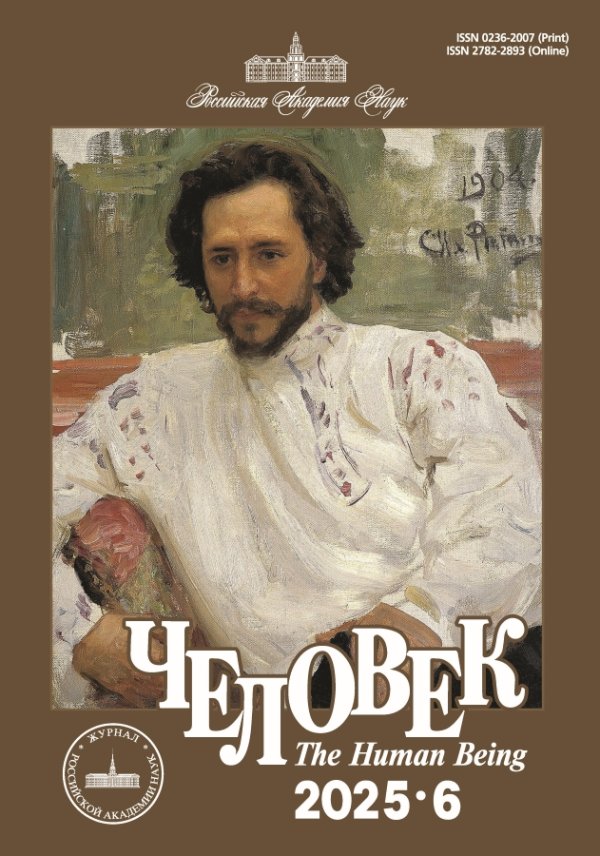Family Model of Organ Donation in a Socio-Cultural Perspective
- Authors: Popova O.V.1
-
Affiliations:
- Institute of Philosophy of the RAS
- Issue: Vol 36, No 2 (2025)
- Pages: 11-31
- Section: Scientific research
- URL: https://journals.rcsi.science/0236-2007/article/view/290824
- DOI: https://doi.org/10.31857/S0236200725020017
- ID: 290824
Abstract
The ideological foundations of the family (relational) model of organ donation are explored. Using the example of this model in modern China, the influence of cultural traditions on the development of innovative medical practices is shown. In China, the family model of organ donation is based on Confucian ideas about the human personality, where the emphasis is on relationships between people, rather than on the autonomous expression of will of an individual subject and their desires regarding the posthumous use of the body. In this context, it is assumed that family members best understand and reflect the last wishes of the deceased regarding the disposal of his body, that is, they are considered as “translators” of the deceased’s value systems that he expressed during his lifetime. The family model of organ donation, considered using China as an example, reflects the specifics of Chinese bioethics, which seeks to combine scientistic attitudes and traditional ethics, that is, while maintaining the influence of traditional Chinese culture. The latter can interact with the development of science and technology and in some aspects even stimulate it. In addition, the article considers the problem of synchronization of chronologies in decision-making about donation. In the process of making such a decision, both the temporality of the past can be actualized, as demonstrated by the experience of countries relying on traditional values in decision-making (China and a number of Asian countries), and the temporality of the future, associated with both the development of new value-based bases for decision-making and the analysis of the consequences of choice. It is shown that the choice in favor of organ donation is associated with the process of value reflection carried out under time pressure. At the same time, the lack of information and psychological stress accompanying the search for a solution determine the further perception of the practice of organ donation. In this regard, the development of a communication strategy regarding organ donation in interaction with relatives of the deceased is of great importance.
Full Text
About the authors
Olga V. Popova
Institute of Philosophy of the RAS
Author for correspondence.
Email: J-9101980@yandex.ru
ORCID iD: 0000-0002-3825-7544
DSc in Philosophy, Leading Researcher, Head of the Department of Humanitarian Expertise and Bioethics
Russian Federation, 12/1, Goncharnaya St., Moscow, 109240References
- Belda I. Razum, mashiny i matematika. Iskusstvennyi intellekt i ego zadachi: per. s isp. [Mind, Machines and Mathematics. Artificial Intelligence and Its Tasks: transl. from Span.]. Moscow: De Agostini Publ., 2014.
- Maliavin V.V. Ideal tselostnosti v voennoi strategii [The Ideal of Integrity in Military Strategy]. Dukhovnaya kul’tura Kitaya: entsiklopediya: v 5 t. [Spiritual Culture of China: An Encyclopedia: in 5 vol.], ed. by M. L. Titarenko; Institute of Far Eastern Studies, RAS. Vol. 5: Nauka, tekhnicheskaya i voennaya mysl’, zdravookhranenie i obrazovanie [Science, Technical and Military Thought, Healthcare and Education]. Moscow: Vostochnaya literatura Publ., 2009. P. 638–639.
- Transplantolog Sergei Got’e: Donorstvo organov — eto proyavlenie sostradaniya drug k drugu [Transplantologist Sergei Gauthier: Organ Donation Is an Expression of Compassion for Each Other]. Pravmir. 2013. May 13. URL: https://www.pravmir.ru/transplantolog-sergej-gote-donorstvo-organov-eto-proyavlenie-sostradaniya-drug-k-drugu/?ysclid= lzbjgmgvqc786994671 (date of access: 18.07.2024).
- Shevchenko S.Yu. Myslennye eksperimenty, prostye voprosy i semeinoe reshenie ob organnom donorstve [Thought Experiments, Simple Questions and Family Decisions About Organ Donation]. Sotsiogumanitarnye problemy organnogo donorstva: mezhdistsiplinarnye issledovaniya: Sbornik nauchnykh statei [Socio-Humanitarian Problems of Organ Donation: Interdisciplinary Research: Collection of Scientific Articles], ed. by O.N. Reznik, O.V. Popova. Moscow: Moscow Humanitarian University Publ., 2017.
- De Groot J., van Hoek M., Hoedemaekers C. et al. Decision Making on Organ Donation: The Dilemmas of Relatives of Potential Brain Dead Donors. BMC Medical Ethics. 2015. Vol. 16. URL: https://bmcmedethics.biomedcentral.com/track/pdf/10.1186/s12910-015-0057-1?site=bmcmedethics.biomedcentral.com (date of access: 25.06.2024).
- Fan R., Wang M. Family-Based Consent and Motivation for Cadaveric Organ Donation in China: An Ethical Exploration. The Journal of Medicine and Philosophy. 2019. Vol. 44. P. 534–553. doi: 10.1093/jmp/jhz022
- Huang J. The History and Outlook of Organ Donation in China. Medical Journal of Wuhan University. 2016. Vol. 37, N 4. P. 517–522. (In Chinese).
- Huang J., Millis J.M., Mao Y. et al. A Pilot Programme of Organ Donation After Cardiac Death in China. Lancet. 2012. Vol. 379, N 9818. P. 862–865. doi: 10.1016/S0140-6736(11)61086-6
- KAO. Kritische Aufklärung über Organtransplantation. 2006. URL: https://initiative-kao.de/ (date of access: 25.06.2024).
- Knhis N.S., Martins S.R., Magalhães A.L.P. et al. Family Interview for Organ and Tissue Donation: Good Practice Assumptions. Revista Brasileira de Enfermagem. 2021. Vol. 74, N 2.
- Li F., Wang C. Individuals Are Inadequate: Recognizing the Family-Centeredness of Chinese Bioethics and Chinese Health System. The Journal of Medicine and Philosophy. 2012. Vol. 37, Iss. 6. P. 568–582. doi: 10.1093/jmp/jhs046
- Liu S., Liu C., Cao X. et al. The Difference in the Attitude of Chinese and Japanese College Students Regarding Deceased Organ Donation. Transplantation Proceedings. 2013. Vol. 45, N 6. P. 2098–2101. doi: 10.1016/j.transproceed.201
- Truog R.D. Consent for Organ Donation — Balancing Conflicting Ethical Obligations. The New England Journal of Medicine. 2008. Vol. 358, N 12. P. 1209−1211.
- Valmisa M. Adapting: A Chinese Philosophy of Action. N.Y.: Oxford University Press, 2021.
- Wang M., Zhang W., Wang X. The Principle of Family Determination in Organ Donation: The Application of Confucian Ethics. HEC Forum. 2008. Vol. 20, N 2. P. 183–196.










